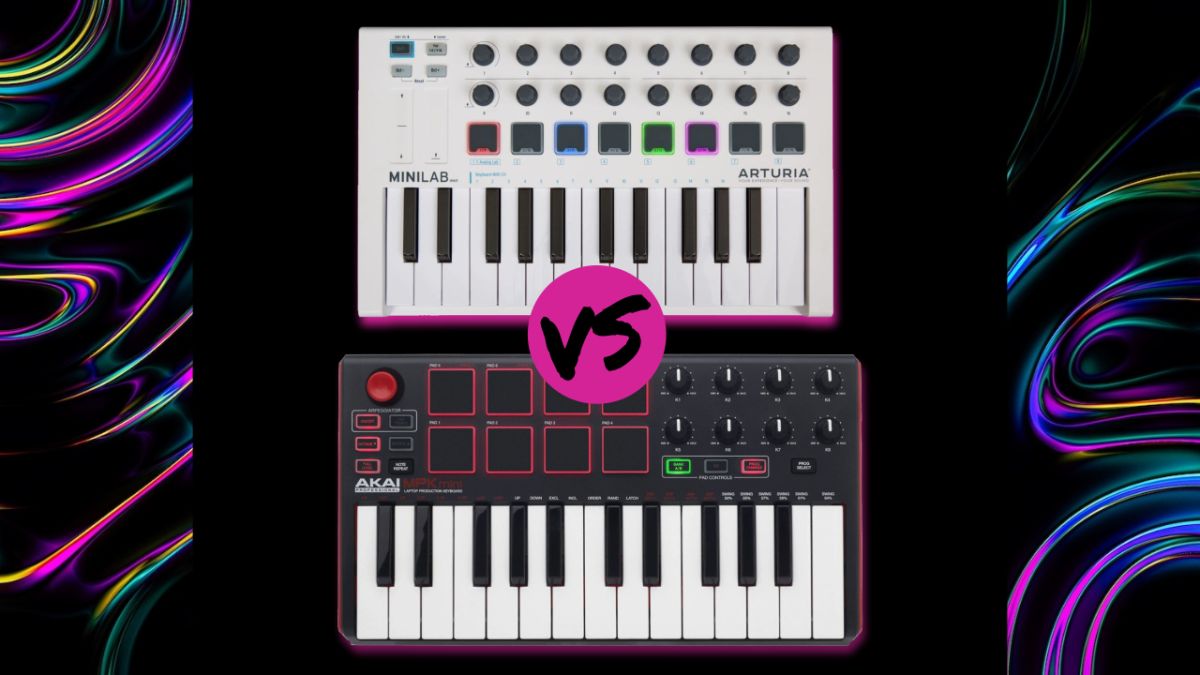MusicRadar is supported by its audience. When you purchase through links on our site, we may earn an affiliate commission. Here’s why you can trust us.
In the market for a cheap mini-key MIDI controller? We’ve lined up two pint-sized best-sellers to help you decide which is best
If you’re someone who likes to make music on the move, you’ll definitely benefit from a MIDI keyboard controller that’s small and lightweight enough to carry around with you on your travels, but which still retains enough features and functions to do everything you need.
At the top of the bestseller list in this category you’ll find two tiny but mighty contenders – the Akai MPK Mini Mk2 and Arturia’s MiniLab MkII, both of which are now in their second generation. But which is best? The answer will depend largely on your needs as a user, so read on for a direct comparison to help you choose.


As far as rotary controllers go, the MiniLab offers sixteen as opposed to the MPK’s eight, the main difference being that those on the MPK are knobs with end stops, while those on the MiniLab are endless, continuous pots. The knobs on the MPK are fairly fiddly with not much height to them, whereas those on the MiniLab are taller and more satisfying to get hold of. It’s also worth noting that knobs 1 and 9 on the MiniLab are push-clickable, so can also double as controls for navigating the included Analog Lab Lite software.
USB connection on both units is via a standard USB type B-style port, with the connection located on the rear panel of the MiniLab and the right-hand panel of the MPK. There’s also a standard 6.3mm jack connector for a sustain pedal on the rear of each keyboard.
Elsewhere, the MPK features a built-in arpeggiator with adjustable resolution, range and modes, plus an MPC-style Note Repeat function for hi-hats or fills and a Full Level button to disable velocity sensitivity, augmenting the function of the pads, another nod back to the original MPC drum machines that veteran beat makers will appreciate.
You’ll also find dedicated buttons to switch between drum pad banks A and B, and select whether the pads transmit program change messages or MIDI cc’s in addition to their regular function as drum pads. The MiniLab meanwhile has a similar button to shift pad banks and both keyboards sport dedicated octave shift up/down buttons.
Although both controllers sport the same number of keys – 25 in total, spanning a two-octave range from C to C – the keys on the Arturia are physically larger than those on the Akai, despite both devices falling into the same ‘mini-key’ category. This of course has an impact on the unit’s physical size – the MPK Mini will happily slot into a 13” laptop bag, whereas you might struggle to achieve this with the MiniLab, which is a full 40mm deeper from front to back.
With the two units side by side, there’s a marked difference in apparent build quality. Like most Arturia kit, the MiniLab II is built like a tank with a metal-bottomed enclosure that feels really solid, while the MPK Mini feels a little lightweight and plasticky by comparison. However, this lighter weight does contribute significantly, along with the unit’s size, to the MPK’s greater portability.
Either keyboard comes in a choice of colours – you can opt for the MiniLab Mk2 in either black or white finish with Arturia’s signature wood-effect side panels, while the MPK Mini Mk2 can be had in black and red with normal keys, white with reversed colour keys or even a striking, limited edition red version with reversed red and black keys.
Expressive control is handled on the Arturia by a pair of touch strips for pitch bend and modulation, replacing the physical pitch and mod wheels often found on regular synths. These never feel quite as good as the physical thing to us, although one advantage is that you can touch a finger anywhere on a strip and that value will be applied instantly; useful in some cases for applying momentary modulation effects.
Akai meanwhile takes a different approach with a four-way mini joystick control for both pitch and modulation. Pitch bending is undertaken by moving the joystick horizontally, with modulation introduced with vertical movement. This takes some getting used to and, although it does work quite well, the joystick itself is quite fragile and could be prone to breakage if you’re continually stuffing your MPK in a bag.
For mobile music makers, then, we’d say that the MPK remains an unassailable choice. However, if portability isn’t your main consideration, the Arturia MiniLab MkII is more solidly built and more than gives the MPK Mini a run for its money when it comes to looks, playability, feature set and value. If you don’t mind the larger size and weight and are just after a feature-laden controller with a small footprint for a specific spot in your studio, we’d go for the MiniLab.
Dave has been making music with computers since 1988 and his engineering, programming and keyboard-playing has featured on recordings by artists including George Michael, Kylie and Gary Barlow. A music technology writer since 2007, he’s Computer Music’s long-serving songwriting and music theory columnist, iCreate magazine’s resident Logic Pro expert and a regular contributor to MusicRadar and Attack Magazine. He also lectures on synthesis at Leeds Conservatoire of Music and is the author of Avid Pro Tools Basics.
Don’t miss the latest deals, news, reviews, features and tutorials
Thank you for signing up to Musicradar. You will receive a verification email shortly.
There was a problem. Please refresh the page and try again.
MusicRadar is part of Future plc, an international media group and leading digital publisher. Visit our corporate site (opens in new tab).
© Future Publishing Limited Quay House, The Ambury, Bath BA1 1UA. All rights reserved. England and Wales company registration number 2008885.







